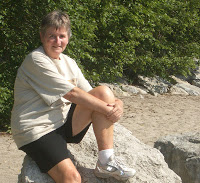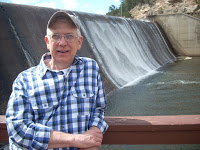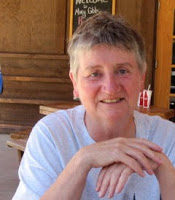When my senior thesis abstract was accepted for presentation at the Geological society of America Meeting held at Portland State University, Oregon in 1973, my registration fee and airline travel from San Diego State to Portland State was covered by my Geology Department. Other out-of-pocket expenses were to be borne by myself—a graduate student still living at home. Luckily, the family financial stars were aligned in my favor. My second cousin, Sandy Gassaway, was a Professor of Economic Geography at Portland State. Sandy and his wife, Carolyn, were able to provide room, board, local transportation, and emotional support for my first public appearance in the scientific world.
I was set-up in Sandy’s home office with a comfortable sofa. I examined he books in his study. One item of note was a bound copy of his Doctoral Dissertation. Sandy’s fieldwork took place in inland Scandinavia, near Russia, during the Cold War.
Its loosely remembered title had to do with mapping and interpreting routes of reindeer migration as accompanied by Finn-markians.
One fun and interesting item to be checked in papers such as this (where I did not exactly comprehend the vocabulary or the importance of the study) is to scan the Acknowledgments section. Sandy’s thanks were extensive and comprehensive regarding his professors and Carolyn.
There were two items that I had questions about.
The first was a line-long object/word in a Scandinavian dialect that Sandy thanked profusely for careful and attentive and complete watching of him in his travels throughout the country.
“So”, I asked Sandy, “what did that word and the accompanying phrase mean, exactly?” Prior to Graduate School, Sandy had spent time in the U.S. Army, doing air-photo reconnaissance regarding where Paratroopers should or should no land in battle situations. “Some hops fields, with long pointy sticks holding up the crops, would make a shish-ka-bob of a soldier who landed on one,” he told me. He looked older than most college students.
Although his studies involved extensive walking around in the back-country, getting to individual study areas involved long trips in small commuter ships that plied up and down each fjord, with many stops a day. Once on board, Sandy noticed a man dressed in snap-brim Fedora and a long overcoat, the only person so attired. The man appeared to be watching him. So, to test his theory, Sandy approached the man, and asked for a light for his cigarette. The man complied, their eyes met, Sandy thanked the man, and he wandered off to smoke his cigarette.
At the next stop, Sandy watched as his cigarette lighter man hurried off the ship and headed for a dock-side telephone booth. After a short telephone call, the man reboarded the ship. At the next port, Sandy watched as the first man left the ship—apparently being replaced by another man—also wearing a snap brim hat and a long coat. The men did not acknowledge one another as they passed each other. After the ship continued on, Sandy would casually approach the second man, and again ask for a light for his cigarette.
Otherwise boring trips were brightened as this scene got engineered and repeated several times. Hence the acknowledgment of the watchfulness and dedication of the homeland’s secret service. Here is the actual quota from Sandy’s dissertation: “the members of Norges Sikkerhetsjenneste who provided constant watchful protection and bolstered the author’s spirits with continual amateur entertainment during the field period…”
The second acknowledgement that caught my eye was, at the end, “Thanks for financial aid from The Ramsey Fund of Portland, Oregon.”
Now, I knew this was Alexander Ramsey Gassaway himself, my second cousin, and, upon my query, he immediately announced the creation of the “Ramsey-Scott fund”, which “honored and funded students who supported their own filed studies.” Myself (whose middle name is Scott) was now included. And our partnership was set.
Every now and then, I’d hear from Augustus Ramsey (our fictional patriarch, the President of the Ramsey-Scott Fund). Later on, Sandy and I agreed that the Fund’s permanent address be Box 1, Bonita, California (my parents’ address), because I no longer lived there, and it gave distance and plausibility to the existence of actual disbursable funds.
I eventually became employed by the US Geological Survey, and as a beginning field geologist, I noticed that my field work continued to be supported by my own funds, (also known as The Ramsey-Scott Fund). I would get an Official Travel Authorization to do fieldwork on my project. I would be paid my hourly wage (travel time included) while in the field. I could not get over-time because those costs normally came out of Project Funds, and my Project was simply not funded. I drove my own truck and paid my own way.
Promotions at the USGS were considered by a Committee of peers every year. And every year required up-dating and re-writing one’s in-house resume. Once, noticing a blank space on a page, I just added, in the honorable family tradition: “1984 to present: partially funded by: The Ramsey-Scott fund, Box 1, Bonita, CA”. This also tidied up the page.
Several promotion cycles (years) later, a bright-eyed peer noticed my funding windfall, and she inquired regarding getting funding for her own field work. This request came to the attention of the Branch chief who observed, in horror, that one of his employees, a Federal Civil Servant, was receiving financial aid from An Unknown and Un-vetted Source (and had been, for several years).
I contracted to explain this, and after “telling my story” to the Branch Chief, I made a fast call to Sandy—who immediately got some letterhead and business cards printed. Sandy composed an explanatory letter to the Chief. He explained, (in Augustus Ramsey’s clipped British style) “the fund’s continued enthusiasm and support of Ms Gassaway’s important research on silcrete”; he enclosed the business card, and mailed it to the Branch Chief.
I still didn’t get a promotion and based on some other things, I ceased employment there the following year. The Ramsey-Scott Fund is now retired.
© May 2017
About the Author
Retired USGS Field Geologist.
Founding member, Denver Womens Chorus









